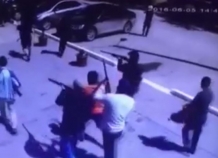DUSHANBE, June 6, 2016, Asia-Plus – Quoting the Interior Ministry of Kazakhstan, media outlet report that suspected Islamist militants killed six people at a National Guard base and two stores selling firearms in the Kazakh industrial city of Aktobe on Sunday.
Almaz Sadubayev, a spokesman for the Interior Ministry, said four of the attackers were killed and seven detained by police in a counter-terrorist operation. Some remained at large, he said.
According to Reuters, Sadubayev said police suspected the attackers were “followers of radical, non-traditional religious movements”, a phrase used in Kazakhstan to describe Islamist militants.
In near simultaneous attacks, the gunmen reportedly killed a clerk and a guard at one firearms store and then wounded three policemen who arrived at the site. At another firearms store, they killed a visitor before police arrived and killed three attackers.
A third group hijacked a bus and used it to ram the gate at the National Guard base where they killed three servicemen before guards and police killed one attacker.
A resident of Aktobe who asked to be identified only by his first name, Valery, told Reuters by telephone he had seen armed police from his balcony and heard a few gunshots.
“They were telling children playing outside to run to their homes,” Valery said, adding that he had also seen low-flying helicopters.
Valery received a text message saying a 10 p.m. curfew was being imposed in the city.
“Right now, everything is normal,” he said about an hour after the curfew, referring to the absence of gunshots or other unusual noise.
Police shut down public transportation, malls and entertainment venues in the city after the attacks, which took place on the eve of the Muslim holy month of Ramadan.
Aktobe, 100 kilometers from the Russian border, was the site of Kazakhstan”s first suicide bombing in 2011 when a local man detonated an explosive device inside the building of the state security service.
Thousands of Kazakhs took part in street protests across the country in April and May which were triggered by a planned land reform but quickly became an expression of general discontent with the government of President Nursultan Nazarbayev, in power since 1989.




